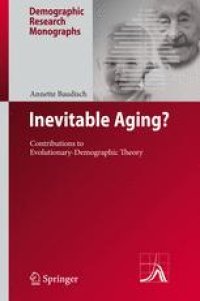
Ebook: Inevitable Aging?: Contributions to Evolutionary-Demographic Theory
Author: Dr. Annette Baudisch (auth.)
- Tags: Population Economics, Aging, Demography, Medicine/Public Health general, Evolutionary Biology, Applications of Mathematics
- Series: Demographic Research Monographs
- Year: 2008
- Publisher: Springer-Verlag Berlin Heidelberg
- Edition: 1
- Language: English
- pdf
Honored by the Max Planck Society with the Otto Hahn Medal 2007 for outstanding scientific achievements
Aging is inevitable: this is gerontological dogma. And humans do inevitably grow old, which is probably why it seems so unlikely to us that other forms of life could escape aging. Escaping aging is not escaping death. Death is an inherent part of life, and it can strike any time. But the question is whether death necessarily becomes more likely as life proceeds. And it does not. The theoretical results in this monograph indicate that life provides alternative strategies. While some organisms will deteriorate over adult ages, for others mortality appears to fall or remain constant, at least over an extended period of life after reproductive maturity. This is empirically observed especially for species that keep on growing during adult ages. Perhaps the diversity of aging matches the diversity of life. My thesis, the central insight of this monograph, is: to deeply understand why some species age it is necessary to understand why other species do not.
Honored by the Max Planck Society with the Otto Hahn Medal 2007 for outstanding scientific achievements
Aging is inevitable: this is gerontological dogma. And humans do inevitably grow old, which is probably why it seems so unlikely to us that other forms of life could escape aging. Escaping aging is not escaping death. Death is an inherent part of life, and it can strike any time. But the question is whether death necessarily becomes more likely as life proceeds. And it does not. The theoretical results in this monograph indicate that life provides alternative strategies. While some organisms will deteriorate over adult ages, for others mortality appears to fall or remain constant, at least over an extended period of life after reproductive maturity. This is empirically observed especially for species that keep on growing during adult ages. Perhaps the diversity of aging matches the diversity of life. My thesis, the central insight of this monograph, is: to deeply understand why some species age it is necessary to understand why other species do not.
Honored by the Max Planck Society with the Otto Hahn Medal 2007 for outstanding scientific achievements
Aging is inevitable: this is gerontological dogma. And humans do inevitably grow old, which is probably why it seems so unlikely to us that other forms of life could escape aging. Escaping aging is not escaping death. Death is an inherent part of life, and it can strike any time. But the question is whether death necessarily becomes more likely as life proceeds. And it does not. The theoretical results in this monograph indicate that life provides alternative strategies. While some organisms will deteriorate over adult ages, for others mortality appears to fall or remain constant, at least over an extended period of life after reproductive maturity. This is empirically observed especially for species that keep on growing during adult ages. Perhaps the diversity of aging matches the diversity of life. My thesis, the central insight of this monograph, is: to deeply understand why some species age it is necessary to understand why other species do not.
Content:
Front Matter....Pages I-XXI
Introduction....Pages 1-16
Front Matter....Pages 17-17
Hamilton’s Indicators of the Force of Selection....Pages 19-34
Further Challenges....Pages 35-46
Front Matter....Pages 47-47
Optimization Models Based on Size....Pages 49-73
An Optimization Model Based on Vitality....Pages 75-122
Directions for Research....Pages 123-139
Back Matter....Pages 141-170
Honored by the Max Planck Society with the Otto Hahn Medal 2007 for outstanding scientific achievements
Aging is inevitable: this is gerontological dogma. And humans do inevitably grow old, which is probably why it seems so unlikely to us that other forms of life could escape aging. Escaping aging is not escaping death. Death is an inherent part of life, and it can strike any time. But the question is whether death necessarily becomes more likely as life proceeds. And it does not. The theoretical results in this monograph indicate that life provides alternative strategies. While some organisms will deteriorate over adult ages, for others mortality appears to fall or remain constant, at least over an extended period of life after reproductive maturity. This is empirically observed especially for species that keep on growing during adult ages. Perhaps the diversity of aging matches the diversity of life. My thesis, the central insight of this monograph, is: to deeply understand why some species age it is necessary to understand why other species do not.
Content:
Front Matter....Pages I-XXI
Introduction....Pages 1-16
Front Matter....Pages 17-17
Hamilton’s Indicators of the Force of Selection....Pages 19-34
Further Challenges....Pages 35-46
Front Matter....Pages 47-47
Optimization Models Based on Size....Pages 49-73
An Optimization Model Based on Vitality....Pages 75-122
Directions for Research....Pages 123-139
Back Matter....Pages 141-170
....